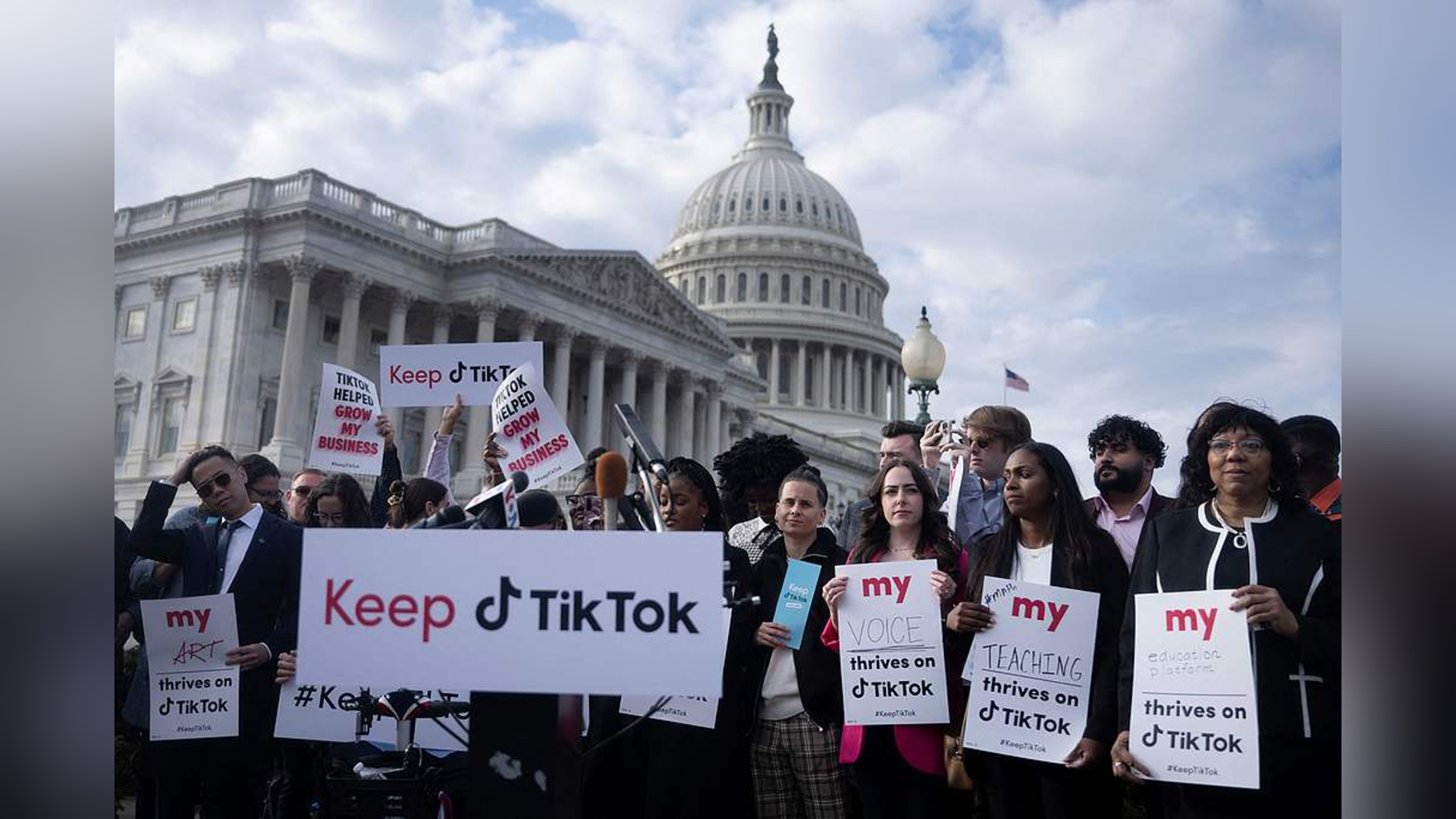
People gather for a press conference about their opposition to a TikTok ban on Capitol Hill in Washington, D.C. on March 22, 2023. /VCG
U.S. President Donald Trump on Friday granted a 75-day extension for Chinese technology company ByteDance to resolve operational issues related to its popular U.S. short video app, TikTok. This marks the second delay since January, when Trump initially postponed the "sell-or-ban" deadline under a 2024 law.
"My Administration has been working very hard on a deal to SAVE TIKTOK, and we have made tremendous progress," Trump posted on his social media platform. "The Deal requires more work to ensure all necessary approvals are signed, which is why I am signing an Executive Order to keep TikTok up and running for an additional 75 days."
Trump added, "We look forward to working with TikTok and China to close the Deal."
The order was announced as White House officials believed they were nearing an agreement for the app's operations to be spun off into a new U.S.-based company, owned and operated by a majority of American investors, with China's ByteDance retaining a minority stake, AP reported, citing a person familiar with the matter.

Bytdance released a statement via its official Weibo account on April 5, 2025.
Bytedance said on Saturday morning that the company "is still in negotiations" with the U.S. government, emphasizing no agreement has been reached due to unresolved key issues. The announcement was made via the company's official Weibo account and reiterated that any potential deal must comply with Chinese legal review procedures.
When asked by Reuters about the status of a deal for TikTok, the Chinese Embassy in Washington said in a statement: "China has stated its position on TikTok on multiple occasions. China has always respected and protected the legitimate rights and interests of enterprises and opposes practices that violate the basic principles of the market economy."
The TikTok ban
The U.S. Congress mandated that TikTok, used by 170 million Americans, must divest from its Chinese parent company ByteDance by January 19, 2025, or face a nationwide ban, citing unsubstantiated national security concerns.
On the eve of the ban, TikTok experienced a 14-hour service disruption, widely interpreted as a technical protest. The app resumed after then President-elect Donald Trump announced a 75-day extension via executive order on January 20, delaying the deadline to April 5.
Negotiations for TikTok's divestiture were complex, involving multiple stakeholders, including U.S.-based companies like Oracle and potential investors such as Blackstone. The proposed deal aimed to transfer majority ownership to American entities while allowing ByteDance to retain a minority stake.
In response to security concerns, TikTok implemented several measures aimed at enhancing transparency and data security. These included establishing transparency and accountability centers, forming a content advisory council, creating a dedicated U.S. data security entity (USDS) to manage American user data, and partnering with Oracle as a "trusted technology provider" to oversee U.S. operations and conduct security audits.
TikTok and ByteDance had also pursued legal avenues to contest the divest-or-ban mandate, arguing that it violated First Amendment rights. Despite these efforts, a federal appeals court upheld the law in December 2024, and the Supreme Court agreed to hear the case, scheduling oral arguments for January 10, 2025. The Court ultimately upheld the law, maintaining the requirement for ByteDance to divest TikTok's U.S. operations or face a ban.
More Americans oppose TikTok ban
Recent data indicates a significant decline in American support for a TikTok ban. A Pew Research Center survey reveals that only 34 percent of U.S. adults now favor such a ban, down from 50 percent in March 2023.
This shift is particularly relevant to local businesses and content creators who rely on TikTok for marketing and revenue. For instance, Terrell Wade – known as @TheWadeEmpire to his 1.5 million TikTok followers – has been expanding his presence on other platforms due to the uncertainty surrounding TikTok's future. He expressed frustration over the ongoing ambiguity, noting that each new deadline "starts to feel less like a real threat and more like background noise."
The potential ban poses significant challenges for local enterprises and creators, disrupting their ability to engage with audiences and affecting their livelihoods.
(With input from agencies)








 User Center
User Center My Training Class
My Training Class Feedback
Feedback












Comments
Something to say?
Login or Sign up for free